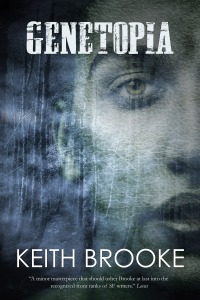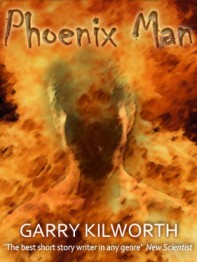 Your first English-language story collection, The Love Machine & other contraptions, is just out. Tell us more about its contents and history.
Your first English-language story collection, The Love Machine & other contraptions, is just out. Tell us more about its contents and history.
The beginning, as stated in Frank Herbert’s Dune, is a very delicate time. Therefore I can’t say I remember much about the beginning of this book, for I was probably in a questionable state of mind then, an assumption I make mainly because I’m in a questionable state of mind most of the time, now included.
In any case, this book collects short stories written over a period of ten years or so. Most of them were published in Hebrew, and some were published in various publications in English and other languages. The recurring machines theme comes for my great love of everything mechanical, both in the real world and outside it, and from the fact that we are machines too. That’s also why I decided to augment the collection with some contraptions.
Contraptions?
Contraptions, to me, are just like fish: I’ve never eaten one. I mean – Gefilte-Fish doesn’t count, right? (If you don’t know what Gefilte-Fish is – count yourself lucky!)
In any case – after I finished selecting the stories to be included in the book, I sat and wrote twelve short-short ones, each dedicated to another impossible yet somehow very real machine. You’ll find there, among others, a Real Machine, an Id Machine, and even a Non Machine. They were not only great fun to write (and hopefully to read!) – I feel that they also bind the other stories of the collection together. Just like appetisers in a really good meal. You do notice the recurring theme of food in this interview, yes?
I’m ignoring it as best I can. So – you’re creative across a number of media: writing, editing, music and film. What are the connections between these? Do you ever stretch projects across several media? Are there even any boundaries?
One of the stories included in the collection is called My Uncle Gave Me a Time Machine. It is based on a song by the same name which was a part of my science-fiction rock album, The Universe in a Pita. That album, in turn, was a part of a radio-play I tried to produce a while back, in which an Israeli rock band is kidnapped by intergalactic mafia and has to pay by performing all over the universe. So projects in one medium influence projects in another. But it also works in other ways: when writing, I listen to the words. They have to have a tune and a tempo. In other words, they have to be a sort of music. In short: my mind is a mess.
Also, I am tempted to say that there are no boundaries, but of course there are: to me, boundaries, or rather – limits – are vital for creating any form of art. When everything is possible and everything is allowed, the result is boring. That’s why I’m a great fan of concept albums and themed projects, and my own works always have strict guidelines.
You’ve collaborated successfully with World Fantasy Award-winner Lavie Tidhar. How does a collaboration work for something as individual as writing fiction?
Lavie is a good friend and a great writer. I would compare collaborating with him to being in a rock band – I’ve been a bass player and a lead singer in several of those – only the work is serial instead of parallel: in a band everyone plays together at the same time, while a writing collaboration, in our case, goes chapter-by-chapter, one by him, one by me. But the rest is just the same: the alcohol, the drugs, the sexy young fans, the fights, the ruined hotel suites, the lot.
What’s special about Israeli SF? Who else should we look out for? Is it a good thing or bad to be labelled an Israeli SF author, rather than simply an SF author?
The very term “Israeli SF” is somewhat problematic, as even most Israeli fans fail to agree what it means. Is it SF written by Israeli authors? Or SF with Israeli protagonists? Or maybe SF written in Hebrew?
The other problem is that, even if we accept all of the above as genuine Israeli SF, that leaves us with only a few active writers, who don’t share much common ground besides that factor. An excellent Israeli writer I’d recommend is Shimon Adaf, whose work never ceases to amaze me.
As for the word “Israeli” being added or omitted to “SF author”, I’d say that this is mainly a question for the marketing department. I was born and raised in Israel, and Hebrew is my mother tongue, so yeah, I’m an Israeli guy, and my writing is influenced by that. On the other hand, most Israelis are sons or grandsons of immigrants: my grandparents are east-Europeans – mostly Polish – which explains the weird humor, and also the silly food. How “Israeli” is that? In some respects, my writing has more in common with Polish and Russian literature. Other Israeli writers have roots in such places as Spain, Egypt or Yemen, and draw their cultural background from there. And of course we all share the love, even if it’s in the form of nostalgia, for good old American and British SF.
What are you working on now?
At the moment I’m working on my second short film, about a young doctoral student who builds a time machine out of the microwave oven in his home, which gets stuck and sends him 6 hours into the future once every 20 seconds, that being only his second-worst problem, the first one being his extremely pissed-off roommate.
I’m also working on a very complex novel dealing with King Solomon, a character which always fascinated me. There are a couple of ancient Jewish legends telling about Solomon making a bad deal with Samedy, the king of the devils. Samedy takes Solomon’s signet ring, throws him to a distant land, takes his form and rules in his place. My idea: Samedy doesn’t take Solomon’s ring, but rather they exchange rings. And Solomon is not thrown in space, but rather – with the help of the ring he got – in time. Now starts the fun.
Describe your typical writing day.
I have a full-time job as a computer programmer, which, if you’re smart enough, is a good way of getting money for nothing-in-particular, meanwhile using an overly powerful computer for making your own stuff. I write in bits and pieces over the day, and in between I take pictures, edit video projects, soundtracks and texts, eat and sleep. I also do a bit of programming, yeah, but don’t tell my bosses at work – I don’t want them to get used to it.
What would you draw attention to from your back-list?
The Tel Aviv Dossier, which I co-wrote with Lavie Tidhar. I shamelessly declare that it’s not only the craziest book I wrote, but also the craziest book I’ve read.
If you were to offer one snippet of writing advice what would it be?
No excuses. If you find yourself in the need of any excuse whatsoever regarding any part of a story or a book – it isn’t good. Make it so good that you don’t need excuses. Or throw it away.
Also, regular meals are important.
So… the easy one: what’s the future of publishing? How will writers be making a living and publishing in five or ten years? What will readers be reading?
I am tempted to say that life will get better and that writers will get more money for their work due to the advances of e-books. However, I don’t think it’ll happen. The main factor for succeeding in any form of art was, is and will remain the marketing department. In other words, the concept of big publishers will stay with us, even while the technology changes.
I like paper books quite a lot, and the first thing people notice, when they get into my house, is the terrific amount of books in it. Well, maybe that’s the second thing, right after the terrific amount of bass guitars. Still, I do most of my reading on a Kindle these days, and I think it’s a game changer for the readers. Especially ones who used to carry one kilogram of books per flight, and can now reduce that to whatever it is the Kindle weighs.
Any last words to your audience, then?
No, sir. You haven’t heard the last of me!
Nir Yaniv is a writer, musician, editor and filmmaker based in Tel Aviv. His short stories were published in Israel and outside it, including such publications as Weird Tales, Apex Magazine and Chizine. And they have been translated into German, Portuguese and Polish. His first story collection, One Hell of a Writer, came out in 2006. Two novels he co-wrote with Lavie Tidhar were published in 2009: The Tel Aviv Dossier and Fictional Murder. His second story collection, The Love Machine & Other Contraptions, came out in 2012.
Nir founded Israel’s first online SF&F magazine, sf-f.org.il, in which he served as chief editor for seven years; went on to edit Dreams in Aspamia, a printed speculative fiction magazine, and created the first Hebrew science fiction rock album, The Universe in a Pita.
Nir’s first short film, Conspiracy, was screened in film festivals in Israel and in the UK. He served in various film projects as cameraman, soundman, sound-editor, and even actor.
Buy stuff:
- The Love Machine & Other Contraptions
- The Tel Aviv Dossier
Amazon US | Amazon UK- Even more: http://www.niryaniv.com





 Your first novel, Siege of Stars, is just out, the opening instalment in a projected trilogy of Big Ideas SF. Tell us more about the novel.
Your first novel, Siege of Stars, is just out, the opening instalment in a projected trilogy of Big Ideas SF. Tell us more about the novel. August 2012 saw publication of your first novel, Rituals (Rhapsody of Blood, Volume One), a dark and eclectic romp through history and myth which opens very appropriately with quotes from Nietszche and Cyndi Lauper. Tell us a bit more about this novel.
August 2012 saw publication of your first novel, Rituals (Rhapsody of Blood, Volume One), a dark and eclectic romp through history and myth which opens very appropriately with quotes from Nietszche and Cyndi Lauper. Tell us a bit more about this novel. Circlet Press have just published the first electronic edition of your collection, The Drag Queen of Elfland. Tell us a bit about the stories in this book.
Circlet Press have just published the first electronic edition of your collection, The Drag Queen of Elfland. Tell us a bit about the stories in this book.

